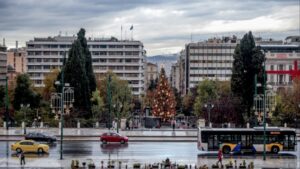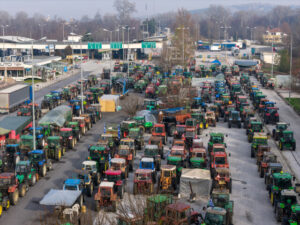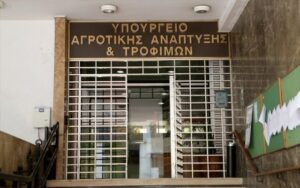Almost every Saturday afternoon, I hear a voice from the other end of the phone asking me, “Dimitraki, which movie should I watch?” And I reply, “Michele, go see Emilia Perez, for instance.”
The nickname “Michele” for Michalis Chrysochoidis comes from one of the early masterpieces by Paolo and Vittorio Taviani, San Michele aveva un gallo (Saint Michael Had a Rooster).
Our lively discussions started from a need to talk about his book On the Same Path, published by Patakis. It’s a book written in a deeply personal style, as if he were speaking directly to the reader. It uses simple language, avoids lofty literary ambitions, but delves into his life experiences and the subject of terrorism.
The complete transformation and evolution of the Police—from amateurism, corruption, and utter disorganization to a modern crime-fighting and citizen-protection service—are documented in these 260 pages.
The tireless, passionately hard-working Michalis Chrysochoidis. Back in his student days, he even ventured into petty delinquency, occasionally stealing fruits, which he later unloaded with a truck and sold in markets across Skopje, Serbia, Austria, and Germany.
The trucker Chrysochoidis was once beaten with metal bars by two fellow truckers. The long-haired MP who drew criticism from the late Evangelos Averoff: “Look at this disgrace.”
The minister who tackled the “November 17” terrorism and, early on, with help from Theodoros Pangalos, suspected Alexandros Giotopoulos and Vassilis Tzortzatos.
Chrysochoidis praises two Britons who greatly aided his organizational and analytical skills: Nick Foster, an MI6 agent stationed at the British Embassy, and his wife, Francesca Flesati.
What sends shivers down one’s spine, however, is the 90% approval rate in Greek society in 2000 for the “superheroes” of “November 17.” Just 24 years ago—so near yet so far!

Scene 1: “We bought cheap—and stole from the fields”
DIMITRIS DANIKAS: The first time you appeared as an MP, you had long hair.
MICHALIS CHRYSOCHOIDIS: Yes, I was young, around 28 or 29, with wild, curly hair. I wasn’t wearing a tie. When I went to be sworn in, as the youngest MP, I automatically became a chamberlain and had to step up. I saw Averoff turning to Rallis and saying, “Look at this mess.” I was truly embarrassed because I’ve always been a shy and reserved person. I never sought to provoke with my behavior. That day left me genuinely upset.
D.D.: In your village in Imathia, as you write in your book, there was significant political division, a post-Civil War rift among the people.
M.Ch.: The division was massive. It weighed on my soul from a young age. I saw women dressed in black and heard half-spoken words from my family and relatives. There was hatred between families, but I couldn’t pinpoint its cause. Much later, I understood these were Civil War-era murders where families had lost two or three children.
D.D.: Your fellow villagers from the political Center?
M.Ch.: It was a centrist village (he refers to Nisi, a lowland village in the Municipality of Alexandria, Imathia Prefecture), as about 70% of the inhabitants were refugees, Venizelists, and the remaining 30% were locals—not conservatives either. These centrists I describe during the Civil War supported EAM without being communists. I sensed something dark in the community, but I couldn’t define it since I was very young.
D.D.: Your father wanted you to become a military lawyer to secure a lifetime career.
M.Ch.: Like most parents, my father wanted us to achieve stability right after high school, relieving the family of financial burdens.
D.D.: Politicians are often labeled as career politicians, lacking real work experience. But you started by working with your hands on the farm.
M.Ch.: Literally, with my hands. At 14, I was working daily, harvesting beans and carrying 100-kilo sacks.
D.D.: And you sold vegetables illegally, without receipts, traveling in trucks.
M.Ch.: We bought vegetables cheaply from farmers, stole some from fields, and sold them in areas where no one knew us.
D.D.: Not just nearby, you even took them abroad. You mention trips to Germany, passing through Skopje…
M.Ch.: That came later, when I was a university student.

Scene 2: “The slogan I never believed in”
DIMITRIS DANIKAS: You were a law student, and during summers, you worked?
MICHALIS CHRYSOCHOIDIS: I worked during winter breaks too.
D.D.: Your father didn’t give you money?
M.Ch.: He did, but it wasn’t enough. We were a family that worked a lot, and I didn’t like sitting around. I wanted to work constantly. I had a driver’s license and worked as an assistant truck driver, traveling to Germany, Italy, Austria—any major market of the time. To get there, we passed through Yugoslavia.
D.D.: You mention noticing differences between Yugoslavia and other countries.
M.Ch.: Yes, the slogan “EEC and NATO, the same racket” never resonated with me. I saw the poverty in Yugoslavia daily. Also, a friend and I would smuggle peaches and other fruits to Bitola in Skopje. We bribed Greek and Macedonian border police to cross from Florina to Bitola and sell at the local market, where poverty was glaring.
D.D.: You were frequently breaking the law?
M.Ch.: Just minor infractions.
D.D.: But you traveled as far as Germany?
M.Ch.: We went to Germany legally for exports.

Scene 3: “They beat me to a pulp…”
D.D.: The first violent encounter you describe involves two men attacking you with crowbars, right?
M.Ch.: It was Christmas Eve. I was a student—around ’78—loading a trailer with beets in a remote area near Giannitsa to take them to a factory. It was a harsh winter, with muddy fields. I saw some men asking for help. I explained, “Guys, I can’t help right now; I need to load up first”—my empty truck couldn’t tow. But they were drunk and wouldn’t listen. As I tried to leave, they pulled me out and beat me with crowbars. I spent a week in the hospital.
D.D.: How did you enter politics?
M.Ch.: I was highly active, serving as a PASOK party secretary. Later, I became a prefect in Karditsa (1988-89). I was well-loved for being hardworking and approachable. My authenticity resonated with people. To this day, thousands from Imathia have my phone number and call me, showing mutual affection. This connection spurred them to urge me to run for office. I ran and came out first, doubling the votes of the runner-up. Ever since, I consistently garnered 22,000-25,000 votes, with the second-place candidate receiving only 7,000-8,000.
D.D.: Did you write your book alone?
M.Ch.: Yes, within about a year. I wrote it to share my views on politics. Unlike popular belief, politics is a continuous effort, demanding sweat and dedication. Serving it wholeheartedly gives it meaning. That’s my stance, and it has proven right.

Scene 4: Unjust Accusations
DIMITRIS DANIKAS: Let’s talk about terrorism, a topic of great interest. What was your first encounter with the police?
MICHALIS CHRYSOCHOIDIS: It was during a protest when I got hit—not badly, but enough to learn firsthand that police use force. A baton hit me on the back while I was a student. I had no connection with the police, no prejudice, but also no relationship. They felt like something entirely foreign.
D.D.: Who thought of appointing you as minister?
M.Ch.: Simitis did. I had been a long-serving deputy minister—around five years—in the Ministry of Commerce. I was successful there, especially in reducing prices to curb inflation as part of our effort to join the Economic and Monetary Union. In my book, I describe the serious work I did and the exceptional businesspeople I met.
D.D.: You mention Spyros Sklavenitis, who owned a few supermarkets back then. You speak highly of him, though he was much older than you.
M.Ch.: He was like a grandfather, and I felt humbled by his politeness and demeanor. Sometimes he brought his children along and made sure they were equally courteous. Later, when he was dying, I visited him in the hospital. He was unresponsive, but his children stayed by his side 24/7. That image remains one of the most moving of my life. They proved their worth by expanding their father’s business into a giant.
D.D.: From the Ministry of Commerce to Public Order—how did that happen?
M.Ch.: Simitis called me, asking me to take over Public Order after the Öcalan affair.
D.D.: Pangalos is often accused of handing over Öcalan.
M.Ch.: Pangalos wasn’t the only one accused—others were too, unjustly. At that time, Filippos Petsalnikos was the Minister of Public Order, and I replaced him. It was a completely foreign domain to me, and I initially experienced a major shock. It took a long time to recover because I was an emotional person who believed in achieving results through hard work. But then, an incident happened—a bus hijacking. Do you remember it? The police had no protocols for such situations; it was Greece’s first hostage crisis. That night, during crisis management, the assailant was killed in Albania, but tragically, a young man from Thessaloniki also lost his life. I was devastated, realizing how unprepared I was. It pushed me to equip myself with knowledge, tools, and training to excel. This incident left me emotionally paralyzed for some time but also marked the beginning of a period of intense learning and development.

Scene 5: Disorganization and Corruption
DIMITRIS DANIKAS: And then you encountered the corruption within the Police Force.
MICHALIS CHRYSOCHOIDIS: Yes, just as you put it. Massive corruption. That’s when some changes were initiated.
D.D.: You mention an exceptional officer, Georgakopoulos.
M.Ch.: A true soldier, a very strict man who had recently lost an eye in an unfortunate operation. It was a grim period for the police, as things kept deteriorating.
D.D.: Completely disorganized.
M.Ch.: Disorganized, corrupt, unable to meet the demands. Georgakopoulos took charge of the corruption issue, enduring significant backlash. Meanwhile, I started implementing institutional reforms. I established the Police Headquarters, created the Internal Affairs Division, and introduced a series of major changes that restructured the Police Force, setting it on a virtuous path.
D.D.: Was corruption widespread?
M.Ch.: Back then, I couldn’t fully grasp the extent, but I could tell from the pressure Georgakopoulos faced. To me, he was a heroic figure. It was clear there was a serious problem.
D.D.: Then you met another outstanding officer, Syros.
M.Ch.: Yes, Syros had two remarkable traits. He was deeply empathetic, very humane. I remember when he was head of the Counter-Terrorism Unit, a convicted criminal called him from prison. Syros greeted him with, “Hey, you rascal, back in again?” The criminal replied, “You put me here, Chief.” Syros asked, “What do you need?” The man said his mother needed to go to the hospital. Syros sent his driver to take her. He spoke with criminals not to exploit them for information but because he genuinely cared. That was his first virtue. The second was his methodical approach to interrogation. He was exemplary, a model professional.

Scene 6: Foster and Flesati
D.D.: You spoke with individuals linked to terrorists. Who was the “X” you mention? Can’t you reveal the name?
M.Ch.: I didn’t speak with terrorists but with people well-acquainted with the milieu. And I spoke not as a policeman but socially. These were individuals who had observed the evolution of events, primarily during the anti-dictatorship struggle. They knew the key players and had analytical insights. I tried to understand why someone who fought against dictatorship would later carry weapons and plant bombs during a democratic era. What drove them?
D.D.: Whose idea was it to explore the theory that the mastermind behind “17 November” came from Paris and that the professors there during May ’68 should be investigated—yours or Pangalos’?
M.Ch.: Pangalos had firsthand experience with the events of the ’60s and the anti-dictatorship fight. He could naturally offer analytical views on these matters, but only up to a point. He once called me to his office at the Ministry of Culture, saying, “In my opinion, the leader of ‘17 November’ has ties to Paris.” We had already speculated that it was Giotopoulos.
D.D.: There’s a rumor—not mentioned in your book—that the British directed you toward this theory. True?
M.Ch.: No. The British made significant efforts after Saunders’ murder. Nick Foster, the British intelligence liaison in Greece, and his wife Francesca Flesati, a diplomat and high-ranking member of the British Embassy, were key contacts with the ministry. Foster, an MI6 operative, and Flesati, who provided crucial technical support by bringing in experts, greatly assisted us. They primarily helped us develop a more systematic and analytical approach. Thanks to the British, we upgraded the police’s crime-solving capabilities, focusing not on individuals but on procedural rigor.

Scene 7: The “Superheroes”…
DIMITRIS DANIKAS: The Police had arrested Vasilis Tzortzatos but released him after 24 hours. Shouldn’t they have kept him under surveillance afterward? Isn’t that basic?
MICHALIS CHRYSOCHOIDIS: When Tzortzatos was arrested, every force converged to incriminate the Police and absolve him.
D.D.: Which forces?
M.Ch.: Everyone. The press, those who supported terrorism in some form, believing the Police fabricated cases; public opinion, convinced the Police detained an innocent man to frame him. That’s where it all started. The Police not only didn’t monitor him but were effectively afraid to do their job. That was the prevailing atmosphere back then.
D.D.: There was also a survey conducted, wasn’t there?
M.Ch.: Yes, I commissioned it. Fanaras conducted it. Ninety percent of people believed “17 November” were invincible superheroes.
D.D.: When was that?
M.Ch.: In 2000. After that, with significant help from the British and their Foreign Minister, who came here, we appeared on TV stating clearly they were murderers.
D.D.: You know, the Communist Party (KKE) was firmly against them from the start.
M.Ch.: Always.
D.D.: Since the Wells case. You sided with Wells’ assassination, didn’t you? Admit it.
M.Ch.: When I first heard about it, my initial reaction was, “What was that? These guys are terrifying.”
D.D.: Later, you went to the U.S., met George Tenet, the Greek-American CIA chief, and he told you something shocking: “Michalis, do something. We know nothing about them.” We thought in Greece that the Americans knew everything. Did the CIA really know nothing? Do you believe that?
M.Ch.: Yes, I believe it. They had tried hard but never drew any conclusions from this case.
D.D.: So, the British were the most competent. The Americans weren’t, and the Greeks were slackers.
M.Ch.: Yet in the end, the Greeks proved more capable than anyone.

Scene 8: “Why Are You Just Sitting There…”
D.D.: Didn’t people call in with tips? Weren’t they offered a reward of 100 million drachmas?
M.Ch.: There weren’t many tips, few calls, no real encouragement. If anything changed during my tenure, it was the atmosphere. I began publicly condemning them, calling them murderers. Every day, I met with victims’ families. These people felt guilty, ostracized by society, which suspected them of some complicity. It was profoundly unjust. When I saw the blood, the lifeless girl at the Intercontinental that night, it was as if she spoke to me.
D.D.: And the other victim, Axarlian…
M.Ch.: That had happened earlier. I spoke with his mother, Stavroula, an extraordinary woman. These people gave me drive. Peratikos scolded me, saying, “Why are you sitting in the Minister’s chair? Don’t you feel ashamed? My child was murdered, and you still don’t know who did it.”
D.D.: Did he confront you in your office?
M.Ch.: No, it was during a meeting. I was relatively detached, like most politicians back then.
D.D.: But many years had passed since ’76.
D.D.: They say you’ve been very lucky because, in both the past and recent cases, a bomb exploded in the terrorists’ hands.
M.Ch.: Except a bomb also went off in my office, intended for me. My aide, Giorgos Vasilakis, was killed in my place. I’m alive today because of his sacrifice.
D.D.: Does that haunt you?
M.Ch.: Absolutely. It’s one thing to discuss bombs and another to witness such a violent death. I’ve seen photos of dismembered victims, both American and Greek, mere remnants of people. Experiencing this firsthand made me grasp the profound tragedy of losing a life so unjustly. That shaped everything I did afterward.

Scene 9: The Superheroes Fell Among Fishermen
DIMITRIS DANIKAS: We’re talking about numerous systemic issues. Who helped you solve the case—besides the British—in Greece?
MICHALIS CHRYSOCHOIDIS: The “November 17” case was primarily a police achievement. It was thanks to the capable officers of the Counterterrorism Unit who managed the investigation: then-chief Nasiakos, the remarkable Syros, Papageorgiou, and a group of junior officers who worked impressively. They could track down the real culprits within hours of hearing a name. Also, the forensic lab teams did extraordinary work. The British were invaluable in communication strategy. My competent team of collaborators also supported me in ensuring no mistakes occurred that could politically set us back—no more “Tzortzatos” incidents.
D.D.: What if the bomb hadn’t gone off in Xiros’ hands?
M.Ch.: The Police were ready to arrest Tzortzatos and others because they had evidence. But Xiros’ bomb was the breakthrough. It triggered a chain reaction like an avalanche. I believe it was bound to happen. The case had matured, and even the terrorists realized their actions were futile and outdated.
D.D.: Did “November 17” follow some kind of contracts in their assassinations?
M.Ch.: No, they chose their victims based on their own criteria, ideologies, and personal feelings. The murders of elderly figures like Bodossakis and Angelopoulos suggest a deep-seated hatred toward specific individuals or social classes.
D.D.: Where did they get the money?
M.Ch.: From robberies.
D.D.: Isn’t it absurdly ironic that when the public finally saw these people, they thought, “Are you serious? These fishermen in flip-flops were killing people, and the Police couldn’t find them?”
M.Ch.: Yes, in hindsight. For 90% of people in 2000, the “superheroes” turned out to be mere fishermen.
D.D.: They were insignificant.
M.Ch.: They were operationally capable, courageous even. But no mentally healthy person systematically takes lives.
D.D.: Have you spoken to any of them?
M.Ch.: No, never. Nor do I want to.
D.D.: It’s odd, though. They didn’t seem like murderers but revolutionaries.
M.Ch.: Our mistake was creating an image of invincible superheroes, almost otherworldly beings. But in the end, they were just ordinary people who never deserved the mythical status we imagined.
D.D.: What about today’s reality? Does this phenomenon persist? Is there a branch?
M.Ch.: The phenomenon is very limited now. Only remnants remain. By remnants, I mean individuals who try to revive it across generations, albeit unsuccessfully. It has no future, condemned in the public’s consciousness. Young people engaged in such activities should stop. Many have been imprisoned and suffered greatly. They’d do well to focus on building their lives.
D.D.: And Romanos?
M.Ch.: I have nothing to say about anyone.
D.D.: You once said, “Why should this young man ruin his life?”
M.Ch.: My statement applies to all. It’s a tragedy for young people to engage in these activities when they could build meaningful lives within the framework of democracy and social peace. It’s pointless, and that’s my point. Recently, a young person died in an explosion. That bomb could have killed innocent people.

Epilogue: The End of the Detective and the Cop
DIMITRIS DANIKAS: Is the Police Force today sufficient? People say many officers are assigned to personal security details. Should the Police protect a major businessman, for example? Shouldn’t he pay for his own protection?
MICHALIS CHRYSOCHOIDIS: First of all, one of the Police’s duties is to provide security to certain individuals, mainly those connected to politics. As for businessmen, the cases are minimal—rare, in fact—and those are fee-based. This is done after an evaluation by specific committees created for this purpose.
D.D.: What about neighborhood patrols? You once told me that police officers would pass through neighborhoods every five minutes. Did that happen?
M.Ch.: To a large extent, yes, in recent years. Even now, patrols are fairly frequent. Since I returned to the ministry in January 2024 by the Prime Minister’s decision, the Police are increasingly present in neighborhoods. But my main focus now is dismantling criminal groups that trouble citizens—robberies, burglaries, thefts.
D.D.: The Greek Mafia?
M.Ch.: And—exactly—you anticipated me: all forms of organized crime. This is currently my top priority. The goal is to dismantle criminal groups that have learned to live off crime. This is my commitment, which is why I’ve created a new specialized unit.
D.D.: The FBI equivalent. What do you call it now?
M.Ch.: The Directorate for Combating Organized Crime. We’ve also renamed what used to be called Security, now the Directorate of Crime Investigation and Resolution, to shed the loaded terms of “security,” “detective,” and “cop.”
Ask me anything
Explore related questions





